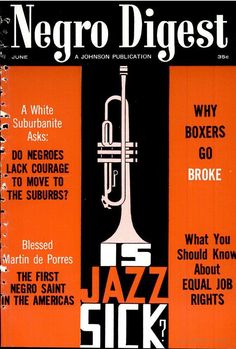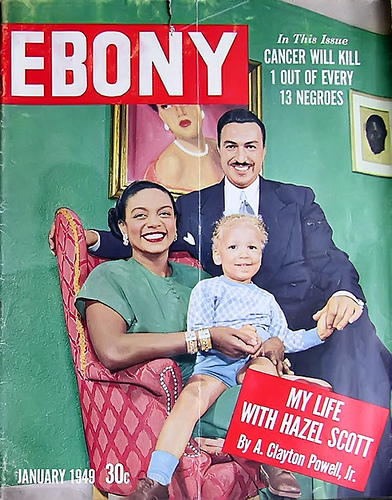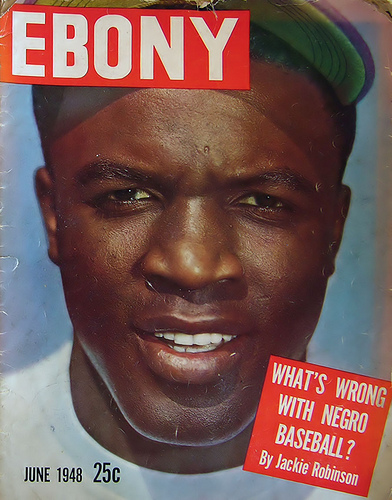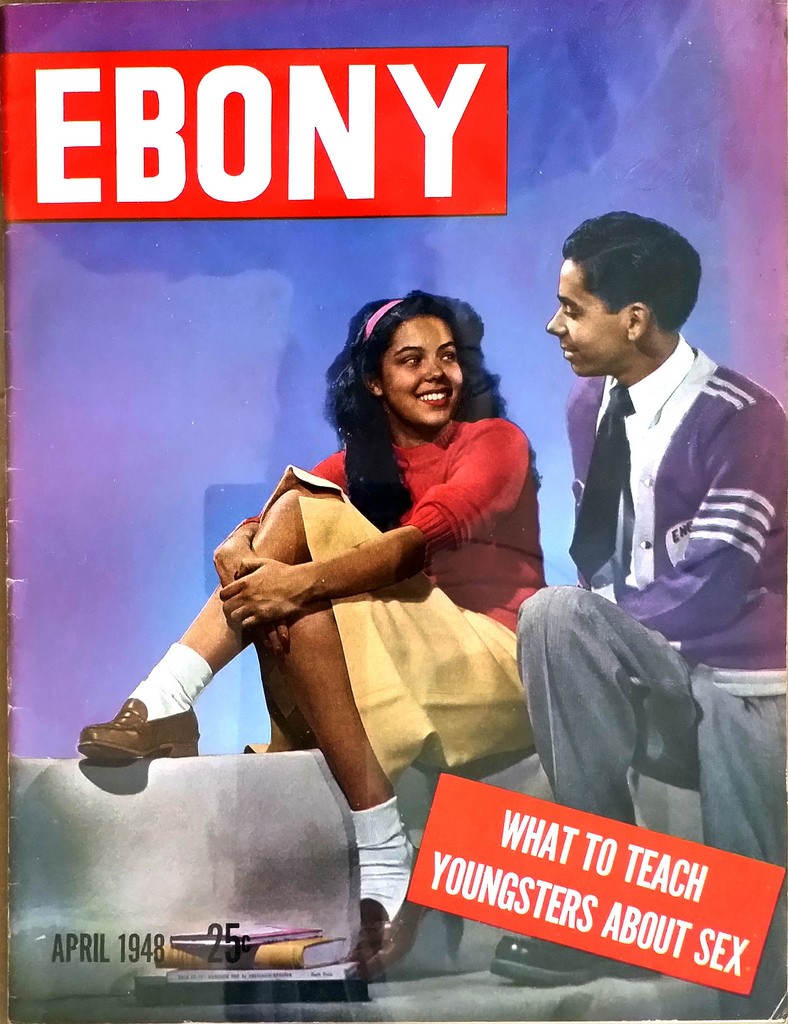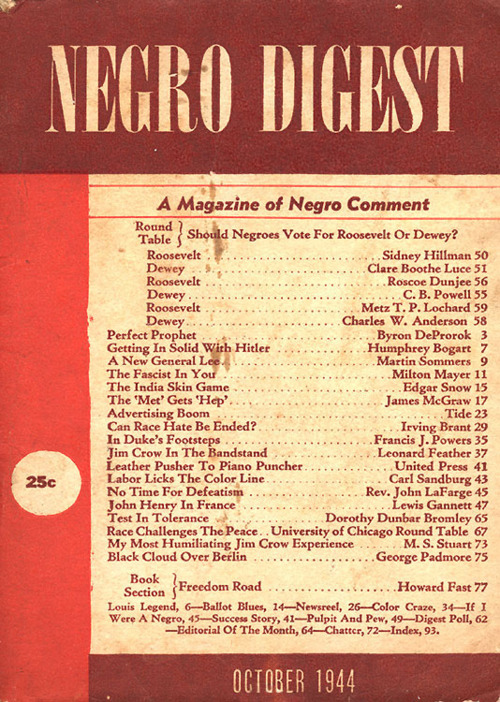
Good Morning POU!
We continue to look at the impact of black writers, artists and publications during the period between the Harlem Renaissance and the Black Arts Movement of the 1960s, particularly the Chicago influence.
Created in 1942 by Chicago-based publisher John H. Johnson, who went on to create Ebony, Tan, and Jet magazines, the original series of Negro Digest was published monthly from 1942 to 1951. An unabashed imitation of Reader’s Digest, it published general articles about African-American life, with an emphasis on racial progress.
The very first issue of The Negro Digest sold about 3,000 copies. Additionally, over the course of six months the magazine published close to 50,000 copies per month.
One of the most interesting and well known columns in the magazine was entitled “If I Were a Negro.” This column concentrated strongly on the unsolicited advice that the African-American race had received, by asking prominent citizens mainly of the white race for resolution to unsolved and/or perceived black problems. As a result of First Lady Eleanor Roosevelt‘s contribution to the popular column “If I Were a Negro,” the copies sold doubled overnight.
Originally printed in the Negro Digest 1(October 1943): 8-9.
Freedom: Promise or Fact
by Eleanor Roosevelt
- If I were a Negro today, I think I would have moments of great bitterness. It would be hard for me to sustain my faith in democracy and to build up a sense of goodwill toward men of other races.
- I think, however, that I would realize that if my ancestors had never left Africa, we would be worse off as “natives” today under the rule of any other country than I am in this country where my people were brought as slaves.
- In a comparatively short period of time the slaves have become free men—free men, that is, as far as a proclamation can make them so. There now remains much work to be done to see that freedom becomes a fact and not just a promise for my people.
- I know, however, that I am not the only group that has to make a similar fight. Even women of the white race still suffer inequalities and injustices, and many groups of white people in my country are slaves of economic conditions. All the world is suffering under a great war brought about because of the lag in our social development against the progress in our economic development.
- I would know that I had to work hard and to go on accomplishing the best that was possible under present conditions. Even though I was held back by generations of economic inequality, I would be proud of those of my race who are gradually fighting to the top in whatever occupation they are engaged in.
- I would still feel that I ought to participate to the full in the war. When the United Nations win, certain things will be accepted as a result of principles which have been enunciated by the leaders of the United Nations, which never before have been part of the beliefs and practices of the greater part of the world.
- I would certainly go on working for complete economic equality and my full rights under a democratic government. I would decide which were the steps that I felt represented my real rights as a citizen and I would work for those first, feeling that other things such as social relationships might well wait until certain people were given time to think them through and decide as individuals what they wished to do.
- I would not do too much demanding. I would take every chance that came my way to prove my quality and my ability and if recognition was slow, I would continue to prove myself, knowing that in the end good performance has to be acknowledged.
- I would accept every advance that was made in the Army and Navy, though I would not try to bring those advances about any more quickly than they were offered. I would certainly affiliate with the labor movement because there is the greatest opportunity for men to work side by side and find out that it is possible to have similar interests and to stand by each other, regardless of race or color.
- I would try to remember that unfair and unkind treatment will not harm me if I do not let it touch my spirit. Evil emotions injure the man or woman who harbors them so I would try to fight down resentment, the desire for revenge and bitterness. I would try to sustain my own faith in myself by counting over my friends and among them there would undoubtedly be some white people.
(Hmmmmmmmmm)
The success of The Negro Digest would lead to the launching of Ebony Magazine in 1945, the most successful magazine catering to African Americans in history and making John H. Johnson an icon in the world of publishing.
Ebony , a pictorial news magazine, was modeled after Life magazine. Ebony celebrated African American life and culture by depicting the achievements of black Americans. It honored black identity by portraying black life, refuting stereotypes, and inspiring readers to overcome racial and other barriers to success.
Ebony also discussed the increasing opportunities for African Americans, suggested ways to overcome obstacles and encouraged blacks to exhibit racial pride. Words emphasized continually in the magazine–respect, dignity, pride, recognition, understanding, hope, inspiration–illustrated Johnson’s personal and professional philosophy.
Ebony occasionally presented works by well-established literary figures such as Langston Hughes and Gwendolyn Brooks. It also frequently published special issues, such as the 1963 one hundredth year commemoration of the Emancipation Proclamation, that highlighted issues deemed particularly relevant to African Americans.
Ebony provided a much needed national forum for blacks. Its contents centered on black history, entertainment, business, health, personalities, occupations, and sports. By highlighting the accomplishments of black Americans, the magazine offered its readers new measurements of black success.
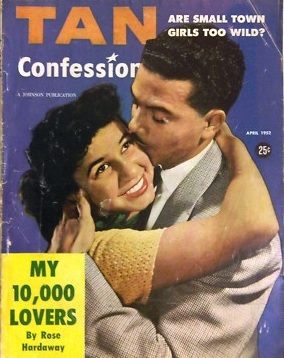
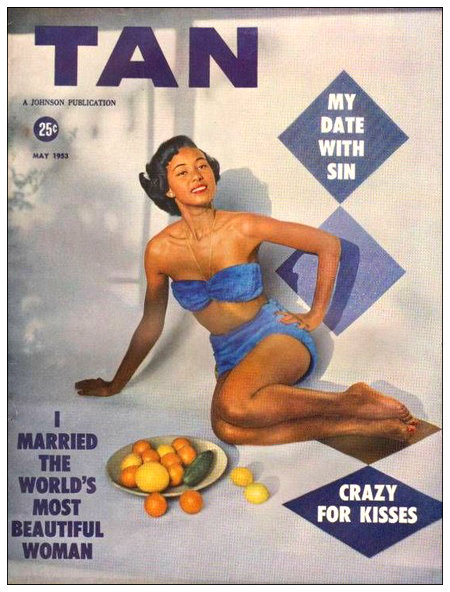
In 1951, Johnson launched Tan (a “true confessions”-type magazine). And later that same year he launched JET.
John Johnson changed the landscape in too many ways to count, encouraging and motivating African Americans by exposing the beauty, creativity and intellect in ways that before could not be seen.


